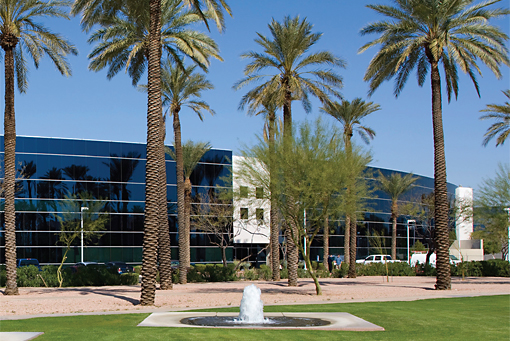| Title | [DAIKIN] DATA CENTER - Phoenix NAP | Date | 16-06-16 15:10 |
| Writer | 최고관리자 | Hit | 1,178 |
본문
CASE STUDY
Data Center
Name
Phoenix NAP
Location
Phoenix, AZ USA
Facility Size
2 stories, 160,000 ft2 facility
Issue
Cooling system with modularity, concurrent maintainability and redundancy
Solution
Daikin Modular Central Plants (MCP)
Phoenix NAP Data Center Chooses Daikin Technology for Mission- Critical Cooling
With data center customers demanding redundant, reliable cooling to safeguard the performance of data servers, Phoenix NAP chose Daikin to help them exceed those customers' expectations. Phoenix NAP, a full service data center in Phoenix, Arizona, offers their customers uninterruptible power as a provider of co-location, dedicated hosting and cloud services. As a carrier-neutral facility, the data center serves as primary network access point (NAP) for the greater southwest region, keeping its customers' data accessible 24/7, 365 days a year.
The two-story Phoenix NAP building, situated on a more than six-acre lot, officially opened its first phase in June 2010 after a complete renovation of an existing one-story warehouse. During the building design stages of that renovation, Phoenix NAP identified the top selection criteria for the facility's cooling needs as a modular solution that could accommodate future growth, concurrent maintainability and ease of maintenance.
As a result of the renovation, the facility was transformed into the mission critical data center equivalent of a Class A office building with both style and security immediately apparent upon entering the sleek lobby with guard station.
Mission-Critical Design Edge
Starting with an initial solution of two Daikin MCPs each featuring a 720- ton centrifugal chiller with variable frequency drive, Phoenix NAP then worked closely with Daikin Applied's Solutions Group to customize the modular chiller plants and add even more redundancies than a standard MCP. Specifically designed for mission-critical facilities, each of the Daikin modular plants at Phoenix NAP includes multiple internal redundancies. The units were configured with dual headers inside each plant, instead of one. In addition, dual chilled water and condenser water pumps with independent power supply and controls keep each module running separately in the case of mechanical or electrical disturbances.
The modular design, which includes removable walls and roofs on the units, enabled Phoenix NAP to meet a tight construction schedule and provided the flexibility to expand cooling capacity with minimal incremental cost compared to typical brick and mortar chiller plants. The pre-assembled units shortened on-site construction time and the pre-commissioning of select components ensured quick start-up on site.
Barry Naegele, director of Daikin MCP Solutions Sales, notes the plants at Phoenix NAP represent the most redundant cooling solution Daikin has built to date. "Uptime is the most mission-critical objective of Phoenix NAP and the cooling system needs to support that. We demonstrated that we could offer uptime support, reliability and redundancy in order to maintain the system in the internal data center environment," he says.
"We were looking for support from the holistic maintenance perspective of the units, including the pumps and controls," says Ian McClarty, President of Phoenix NAP. The Daikin MCPs were integrated with the facility's building automation system by Automated Logic Corporation (ALC) using the BACnet® open standard communication protocol. The ALC system allows for 24/7 monitoring of all building systems and offers customized views with data levels set by user requirements.
McClarty adds, "We appreciate the level of engineering by Daikin and the thought that goes into designing its solutions. For example, mechanical arms were included to hold the pumps to avoid lifting the equipment during maintenance."
Advanced Data Center Design
Phoenix NAP features industry-leading design elements, typically found only in European data centers and uses advanced security protocols to ensure data security. The design configuration separates carrier equipment from customer equipment, making maintenance easier. The advanced design includes two dedicated meet-me vaults with separate fiber runs into the building. A highly secure meet-me room and a separate cross-connect room provides carriers with their own dedicated space.
To optimize air flow, redundant computer room air handler (CRAH) units are arranged in an N+4 configuration with electronically commutated fans with V-frame coil design. Design configuration in a bidirectional closed water loop maximizes redundancy by avoiding single points of failure and allowing for concurrent maintainability.
The facility was designed for staged expansion within the current two-story structure, including the conversion of leased office space to computer rooms.

Specifically designed for mission-critical facilities, each of the Daikin modular plants at Phoenix NAP includes multiple internal redundancies.
To maximize available space for customers and conserve energy consumption, Phoenix NAP located its mechanical area outside the building. The 45,000 ft2 service yard houses the two MCP units, cooling towers, make up tanks, UPS backup systems and other equipment. The secure yard also includes room for additional cooling equipment as the data center expands.
"Potential customers frequently ask about the facility's cooling system," says McClarty, "During early meetings Tech people will have specific questions such as how much cooling do you have and your system design. They also want maintenance information. We are transparent with them because we want to build that trust."
Part of that transparency is an observation module within the existing modular central plant that allows clients to observe the actual cooling equipment and facilitate discussion of the cooling system features.
Benefits for the Bottom Line
Phoenix NAP employs many strategies to drive efficiencies and performance. As a data center, it operates at a relatively low Power Utilization Effectiveness (PUE) rate of 1.39. The Daikin Modular Central Plants help contribute to low energy consumption and a smaller carbon footprint with these features:
Variable frequency drives to improve part-load energy efficiency and reduce demand on back-up systems.
R-134a refrigerant gives sustainable performance for the life of the chiller with zero ozone depletion potential and no phase-out schedule under the Montreal Protocol.
The Modular Central Plant is built by Daikin in its Phoenix manufacturing facility, minimizing transportation costs and helping the local economy.
Positioned for Growth
Due to continued business growth, Phoenix NAP has installed modules 3 and 4 of the Modular Chiller Plant, this time with Daikin Magnitude® chillers. Fully utilized, the Modular Central Plant will consist of 8 modules and 5,700 tons of cooling capacity. The innovative technology of these chillers is well suited to the advanced data center design of Phoenix NAP.
The Magnitude magnetic bearing compressor eliminates the efficiency-robbing friction inherent in traditional centrifugal chillers. An integrated variable frequency drive, or VFD, optimizes part load efficiency to be the best in its class.
The existing observation module allows Phoenix NAP clients to observe the two new Magnitude 700-ton chillers, a key technology behind the cooling system at the data center. In addition to the four MCPs that will be on site at the facility in 2012, the service yard can support an additional four modular plants for a total of eight.
Phoenix NAP stands ready to grow its IT infrastructure and power densities within the facility and Daikin will be ready to provide additional chillers. To help ensure that the cooling system at the data center continues to operate reliably and efficiently, Phoenix NAP chose a multi-year maintenance agreement with Daikin Service for regular inspections and routine service.
McClarty notes the facility is confident in its decision to go with Daikin as it grows and expands its data center capacity. "Finding a one-stop solution provider like Daikin for infrastructure as a service is invaluable to us as a data center. Daikin isn't selling us chillers, they're selling us devices that produce cooling and they support those devices," he concludes.
| Prev | [DAIKIN] DATA CENTER - Herakles 2016-06-16 | ||
| Next | [DAIKIN] DATA CENTER - Waste Management 2016-06-16 | ||






